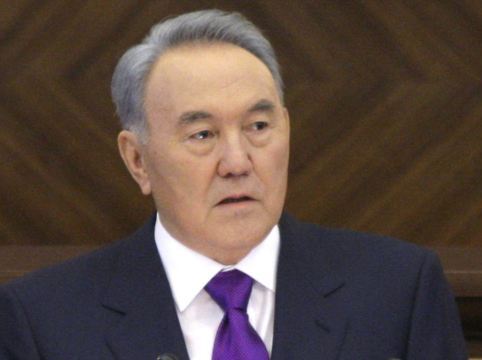Kazakh leader orders to up oil output, refining

By Kamila Aliyeva
Kazakhstan, an energy rich Central Asian country, plans to increase hydrocarbon production through the expansion of the Tengiz field and increasing output from the Kashagan oil and gas field.
Kazakh President Nursultan Nazarbayev ordered to increase the volumes of oil production and refining at a meeting with Energy Minister Kanat Bozumbayev, the press service of Akorda reported.
The President emphasized the need to actualize projects in the sphere of producing and processing of energy commodities.
“Oil production at Kashagan has started. Decision upon whether to expand the Tengiz field has been taken. In addition, we have handled the matter with Karachaganak. In this connection it is necessary to increase oil production and refining. To that end, we are carrying out modernization of three oil refineries,” Nazarbayev said.
Tengiz, Karachaganak and Kashagan are the largest oil fields in Kazakhstan.
Tengiz, one of the largest fields in the world, is being developed by the Tengizchevroil consortium. The project's license area includes the Tengiz field and the Korolevskoye field, which is smaller, but has significant reserves. Recoverable reserves of the Tengiz and Korolevskoye fields are estimated between 750 million to 1.1 billion tons of oil. The total explored reserves in the drilled and non-drilled sites at the Tengiz field's reservoir stand at 3.1 billion tons, or 26 billion barrels.
Karachaganak is also one of the world's largest fields. Its oil and condensate reserves stand at 1.2 billion tons, and gas reserves exceed 1.35 trillion cubic meters. Roughly 45 percent of gas and 16 percent of oil produced in Kazakhstan are being extracted from this field.
Kashagan is a large oil and gas field in Kazakhstan, located in the north of the Caspian Sea. The geological reserves of Kashagan are estimated at 4.8 billion metric tons of oil. The total oil reserves amount to 38 billion barrels; some 10 billion out of them are recoverable reserves. Its natural gas reserves are over one trillion cubic meters. In autumn 2016 Kazakhstan launched oil production at the Kashagan field.
The President further noted the importance of conducting work on gas extraction and the country’s gasification, addressing the Balkhash thermal power plant construction, as well as energy facilities’ privatization.
In turn, the energy minister reported on the fulfillment of the energy production plan according to individual indicators, as well as the increase in the oil export by the end of 2016.
“The oil production plan was 75.5 million tons; the actual amount is 78 million tons,” the minister said, stressing that over-fulfillment observed due to production at Kashagan, where about 1 million tons of oil produced in 2016.
The minister added that oil exports increased to 62 million tons, of which 40 million tons were pumped by the Caspian Pipeline Consortium. “For the first time the refined tar volume reached 325,000 tons due to stimulation by the state. Liquid gas production has increased by 136 tons, “ Bozumbayev said.
The minister also spoke about liquid gas delivery expansion for the needs of motorists based on the agreement between producers and traders, condition of export electricity, plans for intensification of exploration and uranium mining decline prospects due to the unfavorable situation on the market.
Along with other non-OPEC producers, Kazakhstan agreed to cut its oil output to prop up oil prices and put an end to global oil glut. The country pledged to keep average monthly production at a 1.68 million bpd level within first six months of 2017.
Whether the country will agree to extend cuts to the second half of the year is still under a question mark, while the energy ministry of the country previously said that “it is too early” to talk about output reduction in the second half of 2017.
Kazakhstan’s proven oil reserves as of early 2016 stood at 30 billion barrels, according to the BP Statistical Review of World Energy.
--
Follow us on Twitter @AzerNewsAz
